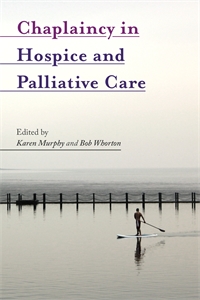 Karen Murphy has worked in hospice chaplaincy for twenty years and has represented chaplaincy at national and international level. She is President of the Association of Hospice and Palliative Care Chaplains (AHPCC). Here, she argues the case for hospice chaplains.
Karen Murphy has worked in hospice chaplaincy for twenty years and has represented chaplaincy at national and international level. She is President of the Association of Hospice and Palliative Care Chaplains (AHPCC). Here, she argues the case for hospice chaplains.
The Association of Hospice and Palliative Chaplains held our annual conference in May and considered the following statement: ‘chaplains are worth having because….’ As a group of skilled, trained and experienced chaplains, we had no problem in accounting for our role and purpose in a palliative care setting. There is a view, however, that in these secular days, the role of the chaplain is no longer valid or necessary. The daily conversations that chaplains share with patients and families soon render this argument redundant.
A patient shared with me recently that she had never had a religious faith, although she often thought it would be of value. Her long held view was ‘when you are gone, you are gone’. Now, facing her mortality having being diagnosed with terminal cancer, her thinking has shifted and for the first time, she is considering her life against an absence of faith. Our conversations are not concerned with my attempts to convert her to my way of thinking or persuade her to find a faith or belief, but to support her in this deeply challenging time. I can enable her to think through her questions and listen. At this point the value of chaplaincy becomes clearer as we offer spiritual listening, which is very different to counselling or social work listening. Chaplains have the capacity to instigate and support conversations that get to the root of someone’s spiritual distress and need. We are not afraid to ask the difficult questions about life’s meaning and purpose, and in my experience, patients seek out those with a belief in order to make sense of the spiritual disturbance and trauma experienced. A patient’s relative expressed this very clearly in a recent conversation, saying: ‘My mother, in her last weeks of life, wasn’t concerned with whether or not the chemotherapy had been successful, or what drugs she would need to be pain free. She trusted the doctors for this. What she valued was the time of the chaplain to help her think about life’s meaning and how to live and die well’.
There is a view that chaplaincy services are a waste of time and resources in a stretched and under –funded health service. The rationale for this view suggests that if patients identify spiritual need, they are likely to have religious faith, therefore will have the support of a local faith community. This view ignores the fact that patients faced with a terminal prognosis, while describing themselves as non-religious, will experience spiritual distress which is unfamiliar and frightening. Chaplains are an essential tool of our health care services which provide distinctive and relevant care for patients who are asking the big questions of life which have never been asked before. The positive impact of chaplaincy based on evidence and research is already emerging, with projects demonstrating the need for fewer GP appointments, reduced medication and a greater sense of well-being to live in the face of impending death. This body of research is growing and will offer to those cynical of chaplaincy, a quantitative and qualitative foundation for the chaplain’s continuing contribution to palliative care services.
For more information on Chaplaincy in Hospice and Palliative Care and to buy a copy of the book, follow this link.
Why not follow us on Facebook @JKPReligion or on Twitter @JKPBooks for more content from our authors.